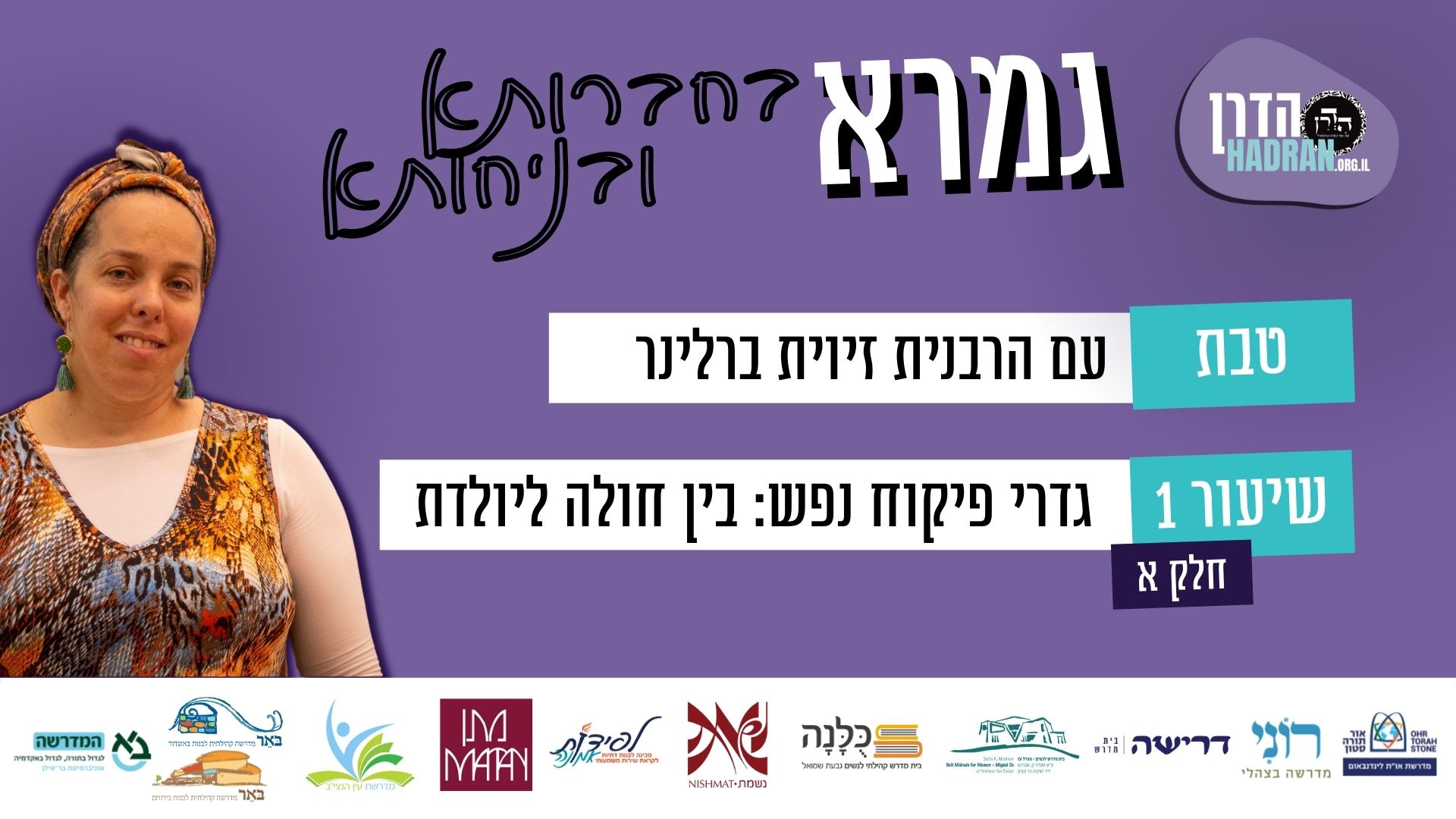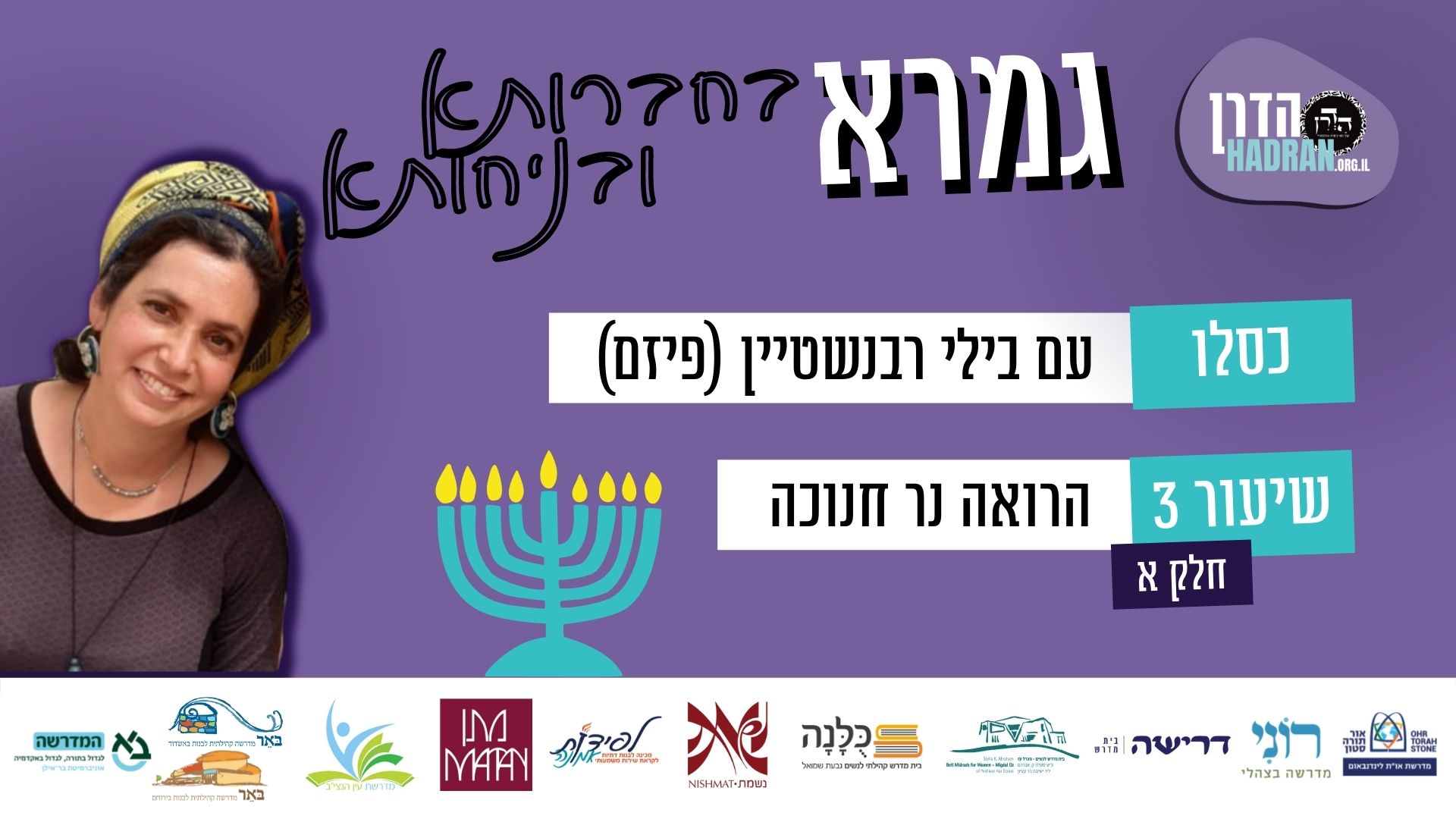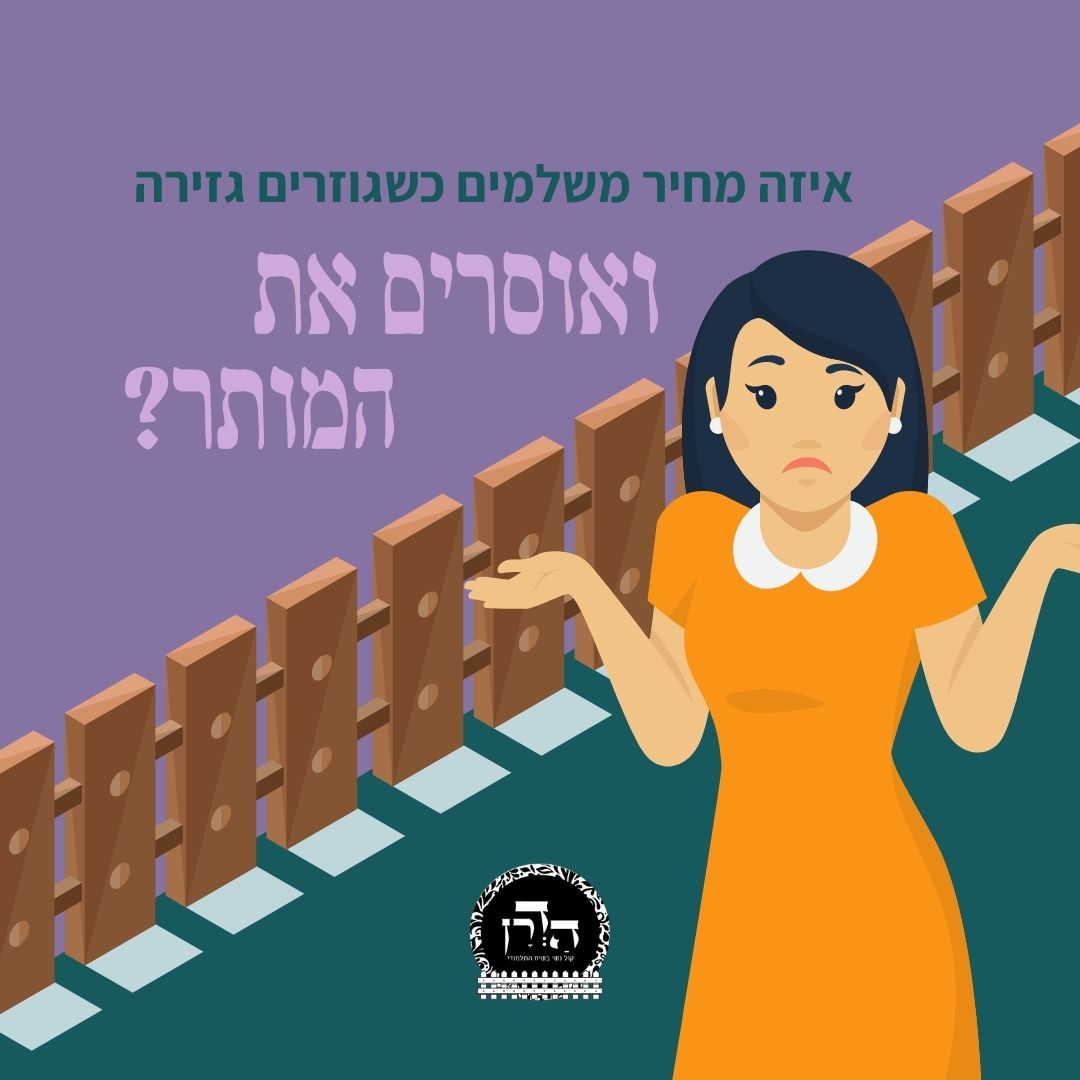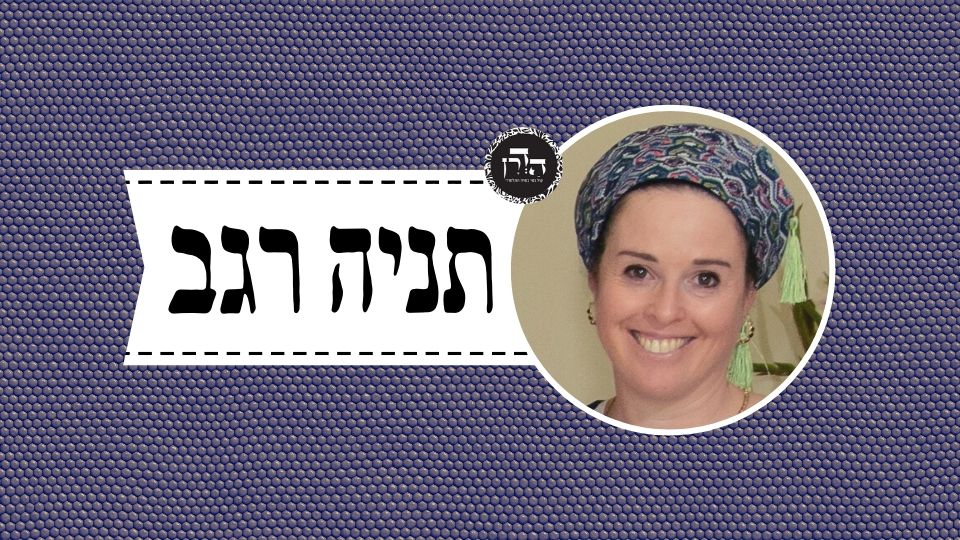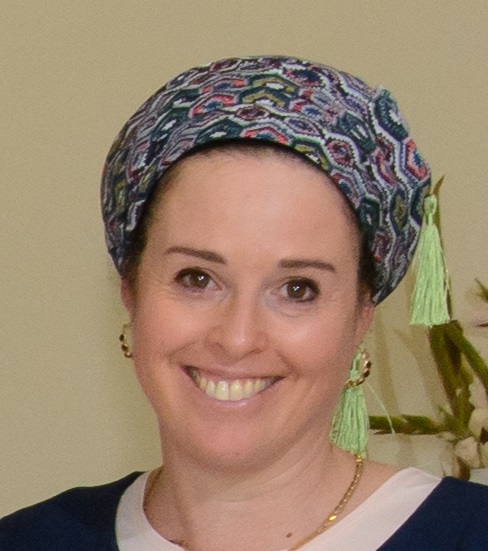איזה דעה תנאית תואמת את המשנה בזבים שבו כתוב שמי שאוכל ראשון או שני לטומאה פוסל את התרומה, אך לא מטמא אותו להיות שני להעביר טומאה למשהו אחר? הגמרא ממשיכה להסביר הסיבה לחלק מהי”ח גזירות – אלו שמופיעים במשנה בזבים. למה כתוב שבית שמאי ובית הלל תקנו שידיים פוסלות את התרומה – הרי כתוב במקום אחר שהלל ושמאי עצמם תקנו? אחרי שהגמרא עונה על השאלה, שואלים ששלמה המלך תיקן את זה. איך פותרים את הבעייה?
הלימוד השבוע מוקדש לזכות ולשלום הַיְימׇנוֹט אֱמוּנָה בַּת באנצ’י (קָסָאוּ) בת 11 שנעלמה במקום מגוריה בצפת, לפני שנתיים, ביום ט”ז אדר תשפ”ד (25.2.24), ולא נודעו עקבותיה.
הלימוד השבוע מוקדש למען ביטחון המדינה, החיילים והאזרחים, ולמען חירותו של העם האיראני. שנזכה בקרוב שיתקיים בנו הפסוק: "לַיְּהוּדִים הָיְתָה אוֹרָה וְשִׂמְחָה וְשָׂשֹׂן וִיקָר”.
הלימוד השבוע מוקדש לזכות וְלִשְׁלוֹם הָיימָנוֹט אֱמוּנָה בַּת באנצ’י (קָסָאוּ), בת 11 שנעלמה במקום מגוריה בצפת, לפני שנתיים, ביום ט”ז אדר תשפ״ד (25.2.24), ולא נודעו עקבותיה. אנו מתפללים שֶׁתִּמָּצֵא וְתוּשַׁב לביתה במהרה!
רוצה להקדיש שיעור?

כלים
הלימוד השבוע מוקדש לזכות ולשלום הַיְימׇנוֹט אֱמוּנָה בַּת באנצ’י (קָסָאוּ) בת 11 שנעלמה במקום מגוריה בצפת, לפני שנתיים, ביום ט”ז אדר תשפ”ד (25.2.24), ולא נודעו עקבותיה.
הלימוד השבוע מוקדש למען ביטחון המדינה, החיילים והאזרחים, ולמען חירותו של העם האיראני. שנזכה בקרוב שיתקיים בנו הפסוק: "לַיְּהוּדִים הָיְתָה אוֹרָה וְשִׂמְחָה וְשָׂשֹׂן וִיקָר”.
הלימוד השבוע מוקדש לזכות וְלִשְׁלוֹם הָיימָנוֹט אֱמוּנָה בַּת באנצ’י (קָסָאוּ), בת 11 שנעלמה במקום מגוריה בצפת, לפני שנתיים, ביום ט”ז אדר תשפ״ד (25.2.24), ולא נודעו עקבותיה. אנו מתפללים שֶׁתִּמָּצֵא וְתוּשַׁב לביתה במהרה!
כלים
העמקה
רוצה להבין מה באמת קורה מתחת לפני השטח של הסוגיה?
שיעורים, פודקאסטים והרחבות של מיטב המורות שלנו יפתחו לך עוד זוויות וכיווני חשיבה.
חדשה בלימוד הגמרא?
זה הדף הראשון שלך? איזו התרגשות עצומה! יש לנו בדיוק את התכנים והכלים שיעזרו לך לעשות את הצעדים הראשונים ללמידה בקצב וברמה שלך, כך תוכלי להרגיש בנוח גם בתוך הסוגיות המורכבות ומאתגרות.
פסיפס הלומדות שלנו
גלי את קהילת הלומדות שלנו, מגוון נשים, רקעים וסיפורים. כולן חלק מתנועה ומסע מרגש ועוצמתי.
שבת יד
לָא מְטַמּוּ? אָמַר רַבָּה בַּר בַּר חָנָה, רַבִּי יְהוֹשֻׁעַ הִיא. דִּתְנַן: רַבִּי אֱלִיעֶזֶר אוֹמֵר: הָאוֹכֵל אוֹכֶל רִאשׁוֹן — רִאשׁוֹן. וְאוֹכֵל אוֹכֶל שֵׁנִי — שֵׁנִי. אוֹכֶל שְׁלִישִׁי — שְׁלִישִׁי. רַבִּי יְהוֹשֻׁעַ אוֹמֵר: הָאוֹכֵל אוֹכֶל רִאשׁוֹן וְאוֹכֶל שֵׁנִי — שֵׁנִי. שְׁלִישִׁי — שֵׁנִי לַקּוֹדֶשׁ, וְאֵין שֵׁנִי לַתְּרוּמָה בְּחוּלִּין שֶׁנַּעֲשׂוּ עַל טׇהֳרַת תְּרוּמָה.
do not render it impure; in other words, they do not render the teruma capable of transmitting impurity to other items? Rabba bar bar Ḥana said: It is the opinion of Rabbi Yehoshua. As we learned in a mishna: Rabbi Eliezer says: One who eats food with first degree ritual impurity status assumes first degree ritual impurity status, and anything with first degree ritual impurity status renders teruma impure. And one who eats food with second degree ritual impurity status assumes second degree ritual impurity status. One who eats food with third degree ritual impurity status assumes third degree ritual impurity status. Rabbi Yehoshua says: One who eats food with first degree ritual impurity status and one who eats food with second degree ritual impurity status assume second degree ritual impurity status. One with second degree ritual impurity status who comes into contact with teruma disqualifies it and does not render it impure. One who eats food with third degree ritual impurity status assumes second degree ritual impurity status vis-à-vis consecrated items, and he does not assume second degree ritual impurity status vis-à-vis teruma. Eating an item with third degree ritual impurity status is only feasible in the case of non-sacred items, as eating impure teruma is prohibited. It is only possible in the case of non-sacred food items that were prepared as if their level of purity were on the level of the purity of teruma.
אוֹכֵל אוֹכֶל רִאשׁוֹן וְאוֹכֵל אוֹכֶל שֵׁנִי — מַאי טַעְמָא גְּזַרוּ בֵּיהּ רַבָּנַן טוּמְאָה? דְּזִימְנִין דְּאָכֵיל אוֹכָלִין טְמֵאִין, וְשָׁקֵיל מַשְׁקִין דִּתְרוּמָה, וְשָׁדֵי לְפוּמֵּיהּ וּפָסֵיל לְהוּ.
With regard to the decree itself, the Gemara asks: One who eats food with first degree ritual impurity status and one who eats food with second degree ritual impurity status; what is the reason the Sages decreed impurity upon him, rendering him impure? The Gemara answers: Because at times one eats impure food, and takes liquids of teruma, and casts them into his mouth and disqualifies the liquids, as the impure food comes into contact with the liquid in his mouth and disqualifies it. To prevent this, the Sages decreed that one who eats impure food becomes impure and must refrain from touching teruma at all.
שׁוֹתֶה מַשְׁקִין טְמֵאִין — מַאי טַעְמָא גְּזַרוּ בֵּיהּ רַבָּנַן טוּמְאָה? דְּזִימְנִין דְּשָׁתֵי מַשְׁקִין טְמֵאִין, וְשָׁקֵיל אוֹכָלִין דִּתְרוּמָה וְשָׁדֵי לְפוּמֵּיהּ וּפָסֵיל לְהוּ. הַיְינוּ הָךְ? מַהוּ דְתֵימָא: הָא שְׁכִיחִי, וְהָא לָא שְׁכִיחִי — קָא מַשְׁמַע לַן.
Similarly, the Gemara asks: One who drinks impure liquids; what is the reason the Sages decreed impurity upon him? The Gemara answers: Because at times one drinks impure liquids, and takes teruma foods, and casts them in his mouth, and disqualifies them. The Gemara asks: This decree is the same as that decree as they were issued for one reason. Why did the mishna list them separately and consider them two different decrees? The Gemara answers: Lest you say that this, people who eat impure food, is common; as it is common for one eating to drink. Consequently, one who eats impure food is likely to drink teruma liquid. And, however, that, one drinking impure liquids who would put food in his mouth while drinking is uncommon. As a result, it is conceivable to say that the Sages did not issue a decree in an uncommon case. Therefore, the mishna teaches us that even in that instance the Sages decreed impurity.
וְהַבָּא רֹאשׁוֹ וְרוּבּוֹ בְּמַיִם שְׁאוּבִין — מַאי טַעְמָא גְּזַרוּ בֵּיהּ רַבָּנַן טוּמְאָה? אָמַר רַב בִּיבִי אָמַר רַב אַסִּי: שֶׁבַּתְּחִלָּה הָיוּ טוֹבְלִין בְּמֵי מְעָרוֹת מְכוּנָּסִין וּסְרוּחִין, וְהָיוּ נוֹתְנִין עֲלֵיהֶן מַיִם שְׁאוּבִין. הִתְחִילוּ וַעֲשָׂאוּם קֶבַע — גָּזְרוּ עֲלֵיהֶם טוּמְאָה.
Among the eighteen decrees that the Sages issued on that day, we also learned: And one whose head and most of his body come into drawn water is impure by rabbinic decree. The Gemara asks: What is the reason the Sages decreed impurity upon him? Rav Beivai said that Rav Asi said: The reason for this is that originally they would immerse to become purified in cave water that was collected, still, and foul. Although this water purified them, due to its stench, the people immersing themselves would pour on themselves drawn water in order to clean themselves. Once they began this custom and transformed it into an established part of the ritual, the Sages issued a decree on the drawn water, rendering it impure, to prevent them from washing with it after immersion.
מַאי קֶבַע? — אָמַר אַבָּיֵי, שֶׁהָיוּ אוֹמְרִים: לֹא אֵלּוּ מְטַהֲרִין, אֶלָּא אֵלּוּ וָאֵלּוּ מְטַהֲרִין. אֲמַר לֵיהּ רָבָא: מַאי נָפְקָא מִינַּהּ, הָא קָא טָבְלִי בְּהָנָךְ? אֶלָּא אָמַר רָבָא: שֶׁהָיוּ אוֹמְרִים: לֹא אֵלּוּ מְטַהֲרִין, אֶלָּא אֵלּוּ מְטַהֲרִין.
The Gemara asks: What is the meaning of this, that they transformed it into an established part of the ritual? Abaye said that they would say: The cave water is not what purifies; rather this, the cave water, and that, the drawn water, together purify. Rava said to him: What difference does it make if they say that? Ultimately, aren’t they immersing in the cave water? As long as they immersed themselves properly, it matters not if they misunderstand the reason. Rather, Rava said: The problem is that eventually they would say: This, the cave water, is not what purifies; rather, that, the drawn water, purifies. Therefore, the Sages issued a decree prohibiting the use of drawn water after purification.
וְטָהוֹר שֶׁנָּפְלוּ עַל רֹאשׁוֹ וְרוּבּוֹ שְׁלֹשָׁה לוּגִּין מַיִם שְׁאוּבִין — מַאי טַעְמָא גְּזַרוּ בֵּיהּ רַבָּנַן טוּמְאָה? — דְּאִי לָא הָא, לָא קָיְימָא הָא.
And the Sages decreed impurity upon a ritually pure person that three log of drawn water fell on his head and most of his body. The Gemara explains: What is the reason that the Sages decreed impurity upon him? The reason for the decree is that if it were not for this decree that a ritually pure person, who does not require immersion, becomes impure when drawn water falls on him, then that, the first decree, would not stand. People would not distinguish between a person who was pure from the start and one who was just purified upon emerging from immersion.
וְסֵפֶר — מַאי טַעְמָא גְּזַרוּ בֵּיהּ רַבָּנַן טוּמְאָה? — אָמַר רַב מְשַׁרְשְׁיָא: שֶׁבִּתְחִלָּה הָיוּ מַצְנִיעִין (אֶת) אוֹכָלִין דִּתְרוּמָה אֵצֶל סֵפֶר תּוֹרָה, וַאֲמַרוּ: הַאי קֹדֶשׁ וְהַאי קֹדֶשׁ. כֵּיוָן דְּקָחָזוּ דְּקָאָתוּ לִידֵי פְסֵידָא, גְּזַרוּ בֵּיהּ רַבָּנַן טוּמְאָה.
The Gemara explains the next case in the mishna: And a Torah scroll; what is the reason the Sages decreed impurity upon it? Rav Mesharshiya said: Since at first, ignorant priests would conceal teruma foods alongside the Torah scroll, and they said in explaining that method of storage: This is sacred and that is sacred, and it is appropriate that they be stored together. Since the Sages saw that they were coming to ruin, as the mice who were attracted to the teruma foods would also gnaw at the Torah scrolls, the Sages decreed impurity upon it. Once they issued the decree of impurity on the Torah scroll, the priests no longer placed teruma near it.
וְהַיָּדַיִם — מִפְּנֵי שֶׁהַיָּדַיִם עַסְקָנִיּוֹת הֵן. תָּנָא, אַף יָדַיִם הַבָּאוֹת מֵחֲמַת סֵפֶר פּוֹסְלוֹת אֶת הַתְּרוּמָה. מִשּׁוּם דְּרַבִּי פַּרְנָךְ — דְּאָמַר רַבִּי פַּרְנָךְ אָמַר רַבִּי יוֹחָנָן: הָאוֹחֵז סֵפֶר תּוֹרָה עָרוֹם, נִקְבָּר עָרוֹם. עָרוֹם סָלְקָא דַּעְתָּךְ? אֶלָּא אָמַר רַבִּי זֵירָא: עָרוֹם בְּלֹא מִצְוֹת. בְּלֹא מִצְוֹת סָלְקָא דַּעְתָּךְ? אֶלָּא אֵימָא: עָרוֹם בְּלֹא אוֹתָהּ מִצְוָה.
The Gemara explains the next case in the mishna: And the hands; the reason that the Sages decreed impurity upon them is because hands are busy. A person’s hands tend to touch dirty or impure objects. Since one does not always pay attention to what his hands touch, and it is inappropriate for holy food to be touched by dirty hands, the Sages decreed impurity. It was taught in a baraita: Even hands that come to be impure due to contact with a Torah scroll disqualify the teruma. The reason for this decree is because of the statement of Rabbi Parnakh, as Rabbi Parnakh said that Rabbi Yoḥanan said: One who holds a Torah scroll in a manner that the scroll is exposed without a covering; his punishment is that he is buried naked. The Gemara wonders: Does it enter your mind to say that he will actually be buried naked? Why should he suffer such ignominy for this sin? Rather, Rabbi Zeira said: He is buried naked, i.e., without mitzvot. And the Gemara wonders further: Does it enter your mind to say that he should be buried naked in the sense of without mitzvot? Will he be stripped of all his merit due to that sin? Rather, say he is buried naked, i.e., without that mitzva. If he touches an uncovered Torah scroll, even for the purpose of performing a mitzva, he is not credited with that mitzva because he performed it inappropriately.
הֵי גְּזוּר בְּרֵישָׁא? אִילֵימָא הָא גְּזוּר בְּרֵישָׁא,
The Gemara asks: Which of these decrees did the Sages issue first? If you say that they issued this decree, impurity of hands in general, first,
כֵּיוָן דְּהָךְ גְּזוּר בְּרֵישָׁא, הָא תּוּ לְמָה לִי? אֶלָּא הָךְ גְּזוּר בְּרֵישָׁא, וַהֲדַר גְּזוּר בְּכוּלְּהוּ יָדַיִם.
once they decreed that first, why do I need that decree of impurity on hands that touch a sacred scroll as well? Once the Sages decreed impurity on hands in general, there is no longer a necessity to decree impurity on hands that touched a Torah scroll, as hands are impure in any case. Rather, certainly the Sages decreed impurity on this, hands that touched a Torah scroll, first. And then they decreed impurity on all hands.
וּטְבוּל יוֹם — טְבוּל יוֹם דְּאוֹרָיְיתָא הוּא, דִּכְתִיב: ״וּבָא הַשֶּׁמֶשׁ וְטָהֵר״! סְמִי מִכָּאן טְבוּל יוֹם.
Among the decrees listed in the mishna, there is the decree that contact with one who immersed himself during the day disqualifies teruma. The Gemara asks: One who immersed himself during the day transmits impurity by Torah law, as it is written: “One who touches it remains impure until evening. He should not eat of the consecrated items and he must wash his flesh with water. And the sun sets and it is purified. Afterward, he may eat from the teruma, for it is his bread” (Leviticus 22:6–7). Consequently, until sunset he is prohibited by Torah law from touching consecrated items, and the same is true for teruma. The Gemara answers: Delete from here, from the list of decrees in the mishna, one who immersed himself during the day.
וְהָאוֹכָלִין שֶׁנִּטְמְאוּ בְּמַשְׁקִין — בְּמַשְׁקִין דְּמַאי? אִילֵימָא בְּמַשְׁקִין הַבָּאִין מֵחֲמַת שֶׁרֶץ — דְּאוֹרָיְיתָא נִינְהוּ, דִּכְתִיב: ״וְכׇל מַשְׁקֶה אֲשֶׁר יִשָּׁתֶה״. אֶלָּא בְּמַשְׁקִין הַבָּאִין מֵחֲמַת יָדַיִם, וּגְזֵירָה מִשּׁוּם מַשְׁקִין הַבָּאִין מֵחֲמַת שֶׁרֶץ.
And among the decrees that were listed, there is also the decree concerning the impurity of the foods that became impure through contact with liquids. The Gemara asks: With liquids that became impure due to contact with what source of impurity? If you say that the mishna is referring to liquids that come to be impure due to contact with a creeping animal, they are impure by Torah law, as it is written with regard to the impurity of creeping animals: “And every liquid that is drunk in any vessel, will be impure” (Leviticus 11:34). Rather, the mishna is referring to liquids that come to be impure due to contact with impure hands. The Sages issued this decree due to liquids that come to be impure through contact with a creeping animal.
וְהַכֵּלִים שֶׁנִּטְמְאוּ בְּמַשְׁקִין — כֵּלִים דְּאִיטַּמְּאוּ בְּמַשְׁקִין דְּמַאי? אִילֵימָא בְּמַשְׁקִין דְּזָב — דְּאוֹרָיְיתָא נִינְהוּ! דִּכְתִיב: ״וְכִי יָרוֹק הַזָּב בַּטָּהוֹר״ — מַה שֶּׁבְּיַד טָהוֹר טִמֵּאתִי לָךְ. אֶלָּא בְּמַשְׁקִין הַבָּאִין מֵחֲמַת שֶׁרֶץ, וּגְזֵירָה מִשּׁוּם מַשְׁקִין דְּזָב.
And among the decrees that were listed, there is also the decree concerning the vessels that became impure through contact with liquids. The Gemara asks: Vessels that became impure due to contact with liquids that became impure due to contact with what source of impurity? If you say that they become impure due to contact with liquids secreted by a zav, e.g., spittle, urine, etc., they are impure by Torah law, as it is written: “And if a zav spits on a pure person and he should wash his clothes and wash in water and he is impure until the evening” (Leviticus 15:8). The Sages interpreted homiletically: Whatever is in the hand of the pure person I made impure for you. Not only did the person who came into contact with the liquids of the zav become impure, but the objects in his hand did as well. Rather, here it is referring to liquids that come to be impure due to contact with a creeping animal, which by Torah law do not transmit impurity to vessels. And the Sages issued a decree with regard to those liquids due to their similarity to the liquids of a zav.
וְיָדַיִם תַּלְמִידֵי שַׁמַּאי וְהִלֵּל גְּזוּר? שַׁמַּאי וְהִלֵּל גְּזוּר! דְּתַנְיָא: יוֹסֵי בֶּן יוֹעֶזֶר אִישׁ צְרֵידָה וְיוֹסֵי בֶּן יוֹחָנָן אִישׁ יְרוּשָׁלַיִם גְּזַרוּ טוּמְאָה עַל אֶרֶץ הָעַמִּים וְעַל כְּלֵי זְכוּכִית. שִׁמְעוֹן בֶּן שָׁטַח תִּיקֵּן כְּתוּבָּה לָאִשָּׁה, וְגָזַר טוּמְאָה עַל כְּלֵי מַתָּכוֹת. שַׁמַּאי וְהִלֵּל גָּזְרוּ טוּמְאָה עַל הַיָּדַיִם!
Among the list of items in the mishna with regard to which the disciples of Shammai and Hillel instituted decrees, were the hands of any person who did not purify himself for the sake of purity of teruma. If he came into contact with teruma, the Sages decreed it impure. The Gemara asks: And with regard to hands, was it the disciples of Shammai and Hillel who issued the decree of impurity? Shammai and Hillel themselves issued the decree. As it was taught in a baraita: Yosei ben Yo’ezer of Tzereida and Yosei ben Yoḥanan of Jerusalem decreed impurity on the land of the nations, that the land outside Eretz Yisrael transmits impurity; and they decreed impurity on glass vessels, even though glass is not listed in the Torah among the vessels that can become impure. Shimon ben Shataḥ instituted the formula of a woman’s marriage contract and also decreed special impurity on metal vessels. Shammai and Hillel decreed impurity on the hands.
וְכִי תֵּימָא שַׁמַּאי וְסִיעָתוֹ וְהִלֵּל וְסִיעָתוֹ, וְהָאָמַר רַב יְהוּדָה אָמַר שְׁמוּאֵל: שְׁמֹנָה עָשָׂר דָּבָר גָּזְרוּ, וּבִשְׁמֹנָה עָשָׂר נֶחְלְקוּ. וְאִילּוּ הִלֵּל וְשַׁמַּאי לֹא נֶחְלְקוּ אֶלָּא בִּשְׁלֹשָׁה מְקוֹמוֹת, דְּאָמַר רַב הוּנָא: בִּשְׁלֹשָׁה מְקוֹמוֹת נֶחְלְקוּ וְתוּ לָא. וְכִי תֵימָא: אֲתוֹ אִינְהוּ גְּזוּר לִתְלוֹת, וַאֲתוֹ תַּלְמִידַיְיהוּ וּגְזַרוּ לִשְׂרוֹף. וְהָאָמַר אִילְפָא: יָדַיִם תְּחִלַּת גְּזֵירָתָן לִשְׂרֵיפָה! אֶלָּא אֲתוֹ אִינְהוּ גְּזוּר וְלָא קַבִּלוּ מִינַּיְיהוּ, וַאֲתוֹ תַּלְמִידַיְיהוּ גְּזַרוּ וְקַבִּלוּ מִינַּיְיהוּ.
And if you say that the baraita is referring to Shammai and his faction and Hillel and his faction, didn’t Rav Yehuda say that Shmuel said: With regard to eighteen matters they issued decrees that day, and with regard to those eighteen matters they disagreed prior to that? The eighteen disputes were only between the disciples of Shammai and Hillel, whereas Hillel and Shammai themselves argued only in three places. Clearly, they were neither party to the disputes nor the decrees. As Rav Huna said: Shammai and Hillel disagreed in only three places and no more. And if you say that Hillel and Shammai came and decreed that teruma that came into contact with hands would be in abeyance, and their students came and decreed to burn teruma that came into contact with hands, then the following difficulty arises. Didn’t Ilfa, one of the Sages, say: With regard to hands, from the beginning their decree was that teruma that comes into contact with them is to be burned? According to Ilfa, there is no uncertainty. Teruma that came into contact with definite impurity is burned. Teruma that is in abeyance may not be destroyed. One must wait until it becomes definitely impure or decomposes on its own. Rather, the explanation is that they came and issued a decree and the people did not accept the decree from them, and their disciples came and issued a decree and they accepted it from them.
וְאַכַּתִּי, שְׁלֹמֹה גְּזַר! דְּאָמַר רַב יְהוּדָה אָמַר שְׁמוּאֵל: בְּשָׁעָה שֶׁתִּיקֵּן שְׁלֹמֹה עֵירוּבִין וּנְטִילַת יָדַיִם, יָצְתָה בַּת קוֹל וְאָמְרָה: ״בְּנִי אִם חָכַם לִבֶּךָ יִשְׂמַח לִבִּי גַם אָנִי״, ״חֲכַם בְּנִי וְשַׂמַּח לִבִּי וְאָשִׁיבָה חוֹרְפִי דָבָר״! — אֲתָא
The Gemara asks further: Still, the matter is not clear, as the decree of hands was issued by King Solomon. As Rav Yehuda said that Shmuel said: At the time that Solomon instituted the ordinances of eiruv and of washing hands to purify them from their impurity, a Divine Voice emerged and said in his praise: “My son, if your heart is wise my heart will be glad, even mine” (Proverbs 23:15), and so too: “My son, be wise and make my heart glad, that I may respond to those who taunt me” (Proverbs 27: 11). The Gemara responds: Came


